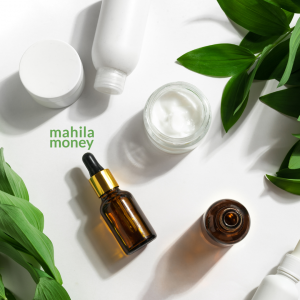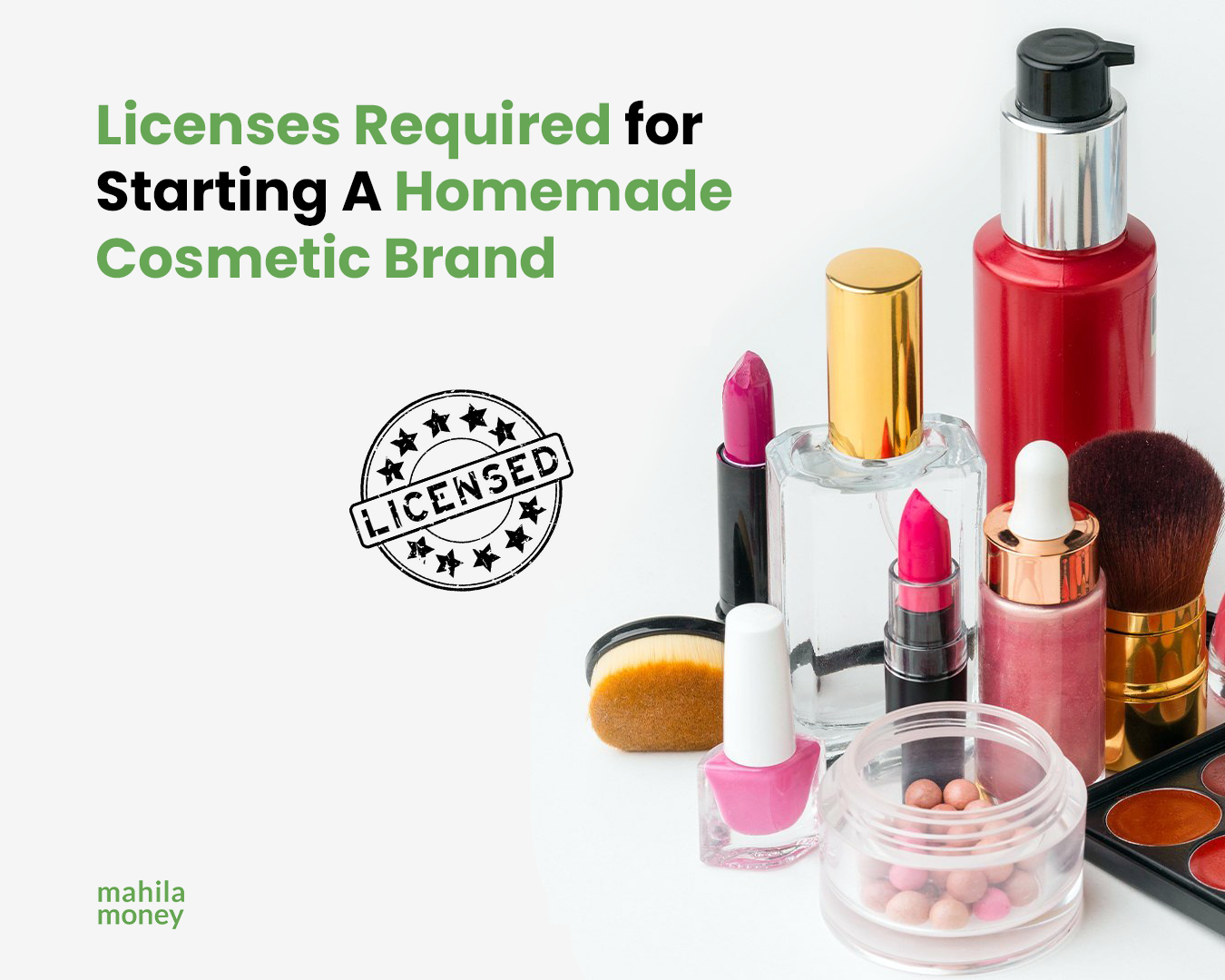Learn about the licenses required for homemade cosmetics in India to ensure legal compliance and build a trusted brand.
The beauty industry is evolving, and with the rise of homemade cosmetic brands, many women entrepreneurs are stepping into this thriving market. But starting a cosmetic business is more than just creating products—it requires compliance with certain legal standards. If you’re wondering, “How do I start my own cosmetic brand legally in India?”, this guide breaks down the licenses required for homemade cosmetics and the steps you need to take to run your business smoothly.
Apply For a Business Loan
List of licenses required for homemade cosmetics in India
#1. Manufacturing License (Form COS-8)
A Manufacturing License is the cornerstone of legally starting a homemade cosmetics business in India. This license, governed by the Cosmetic Rules, 2020, is mandatory for anyone making products, whether on a small or large scale.
- Issued by: State Licensing Authority.
- What you need: Details of your manufacturing setup, product formulations, and proof of compliance with Good Manufacturing Practices (GMP).
- Why it matters: To ensures the safety and quality of the products you manufacture.
Pro Tip: If you’re outsourcing production to a third party, ensure they have the necessary licenses to avoid compliance issues.
#2. Product Testing Certification
Testing your cosmetics is not just good practice—it’s a legal requirement. All homemade products must undergo rigorous testing to ensure they are safe for use.
- Tests required: Stability, toxicity, microbial contamination, and shelf-life testing.
- Compliance: Products must meet the standards outlined in the Drugs and Cosmetics Act, 1940.
Pro Tip: Partner with accredited labs that specialize in cosmetic product testing to guarantee thorough and professional assessments.
#3. Labeling Compliance as per Cosmetic Rules, 2020
Proper labeling is not just about aesthetics—it’s a regulatory requirement. Labels must convey key details to consumers clearly and accurately.
It should include:
-
- Product name and description.
- Complete ingredients list.
- Manufacturing and expiry dates.
- Net content (e.g., weight or volume).
- Directions for use and warnings.
Pro Tip: Always double-check your labels against the regulations to avoid penalties or product recalls.
#4. Non-Animal Testing Certificate
If your products claim to be cruelty-free, obtaining a Non-Animal Testing Certificate is crucial. This certificate verifies that your cosmetics are developed without harming animals.
- Why it matters: Ethical, cruelty-free products are in high demand among consumers.
- Where to start: Collaborate with labs certified for non-animal testing methods.
Pro Tip: Highlight your cruelty-free certification on your packaging and marketing materials to appeal to ethically conscious buyers.
#5. Sale Exemption for Non-Commercial Production
If you are not manufacturing cosmetics for commercial sale, some leniency may apply:
- Non-commercial production includes products for personal use or gifts for family and friends.
- State laws vary, so it’s best to check with your State Licensing Authority for clarity.
Pro Tip: If you plan to scale your operations in the future, secure the necessary licenses early to avoid operational roadblocks.
Additional Registrations & Licenses Required for Homemade Cosmetics in India
- Business Registration
- Choose between sole proprietorship, LLP, or private limited company.
- Helps establish credibility and streamline your business operations.
- GST Registration
- Mandatory for online or interstate sales if your annual turnover exceeds ₹20 lakh.
- Trademark Registration
- Protects your brand name, logo, and tagline, ensuring no one else can use them.
- Trade License or Local Permits
- Required by some municipal authorities for running a business from home.
5 Points to Remember for Women Entrepreneurs Starting Their Beauty Brand from Home
- Start Small but Stay Legal: Ensure you have the necessary licenses even if you’re starting on a small scale.
- Test Your Products Thoroughly: Safety is non-negotiable, and compliance builds consumer trust.
- Invest in Packaging and Labeling: Professional, regulation-compliant packaging adds credibility.
- Know Your Market: Research your target audience and product positioning to stand out.
- Seek Professional Help When Needed: Consult experts for licensing, registration, or product formulation.

FAQs: What Licenses are Required for Homemade Cosmetics Brand in India?
1.How to Get Your Cosmetic Products Registered?
Apply for a manufacturing license through your State Licensing Authority and ensure compliance with Goods Manufacturing Pracyices and testing requirements.
2.What Are the Costs Involved?
Costs vary based on testing, lab partnerships, and state regulations.
3.Do I Need a License for Homemade Cosmetics if I’m Not Selling?
For non-commercial production, licensing may not apply, but state rules differ.
4.Can I Outsource Manufacturing?
Yes, but ensure your manufacturer has all required licenses.
5.Is GST Registration Necessary?
Yes, if your business annual turnover exceeds ₹20 lakh or if you’re doing interstate sales.
By understanding the cosmetic registration in India and other legal requirements, you can confidently start your beauty brand from home while ensuring safety and compliance. Ready to take the first step? Secure your licenses today and build a trusted, legal business in the growing beauty market.

If you are a woman entrepreneur who wants to take your business to new heights and is in need of working capital and entrepreneurship resources, come speak to us on Mahila Money. For more such #JiyoApneDumPe live conversations, download the Mahila Money App on Play Store or visit us on www.mahila.money





I want a small hand made beauty product business from my home…an sale on online….. which legal document is required.